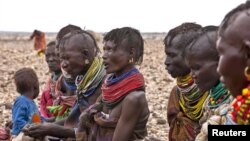The drought in the Horn of Africa is the most urgent humanitarian emergency in the world today. More than 12 million people in Ethiopia, Kenya, Djibouti, and Somalia are in need of emergency assistance.
To address the immediate needs of the drought and famine victims, the United States is working with a number of international partners, such as the UN High Commissioner for Refugees, or UNHCR, the World Food Program, and NGOs to provide essential services such as food, healthcare, primary education, and other services.
United States Secretary of State Hillary Clinton says that while the international community must hurry to deliver life-saving assistance, it must also invest in long-term food security to prevent this crisis from reoccurring.
"We must re-dedicate ourselves to breaking this cycle of food shortages, suffering, and dislocation that we see playing out once again in the Horn of Africa... Investing now decreases the chances that Americans or others will be called upon in the future to face these same challenges in ten or 20 years from now... We will be investing in our own security by supporting political stability and economic growth worldwide."
The United States is providing longer-term support to partner governments through President Barack Obama’s food security initiative, Feed the Future. In Ethiopia, a top priority is strengthening the value chain to help farmers sell their products at local and regional markets. In Kenya, the U.S. Agency for International Development, or USAID, is supporting efforts to connect herders to local markets, improve animal health services, and help local institutions lobby for better trade policies.
The primary responsibility lies with governments and with the people of countries like Ethiopia and Kenya, says Secretary Clinton.
"There must be a concerted effort by governments and people to help themselves, and there is no question that Ethiopia and Kenya are moving in the right direction. Now we must help them continue that progress."
If we succeed, says Secretary Clinton, "millions of people would be saved from this current calamity... And food aid from countries like the United States would be needed much less frequently because we are now supporting self-sufficiency."
Investing In East Africa's Long Term Food Security

To address the immediate needs of the drought and famine victims, the United States is working with a number of international partners.



